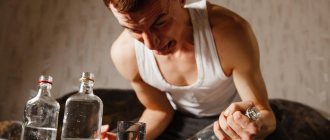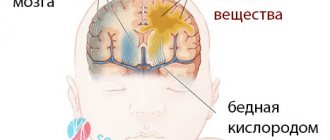Involutional depression is an affective disorder that occurs in old age under the influence of physical changes, changes in social roles and other factors associated with aging. Extremely widespread, occurring in 40% of people over 50 years of age who seek medical help. Women are affected twice as often as men, and symptoms appear on average 5 years earlier.
To make an appointment for a consultation about depressive disorder, call tel. 8(969)060-93-93.
Causes
Experts in the field of psychiatry and psychotherapy consider involutional depression to be a polyetiological disease that occurs under the influence of the following factors:
- Psychological. As people get older, they increasingly look back, think about what didn’t happen and didn’t work out, regret missed opportunities, and realize that they can’t change much. Worries about an insufficiently happy personal life, unrealized reproductive plans, real or imaginary career failures coexist with thoughts about lack of demand and inability to keep up with young people, anxiety about health and a possible deterioration in their financial situation.
- Biological. Health gradually deteriorates, chronic somatic diseases arise or worsen. The physical signs of aging are becoming more and more apparent. Women stop menstruating. In men, potency decreases and problems arise in the sexual sphere.
- Social. Children grow up, leave home, start their own families, which causes the development of “empty nest syndrome.” Professional prospects disappear, and it becomes obvious that the person has “reached his ceiling.” Difficulties arise when changing jobs. People of the same age—family and friends—begin to pass away. The number of old relationships decreases, new connections are not formed. There is a feeling of loneliness.
Family life crisis
At this age, as a rule, there is also, to put it mildly, calm in marital relationships. Women by this age are already experiencing menopause. The last hormonal explosion ends. The sexual sphere of people who have reached involutionary age begins to gradually fade away.
You can approach this differently, you can do everything possible with all your might, just to preserve that same former youthful enthusiasm. Unfortunately, physical ill-being and hormonal decline sooner or later still lead to this sexual calm.
In relationships in a married couple, the everyday or some kind of mutually supporting professional component also often comes to the fore. These relationships become more and more dried out, they become more and more bland, business content appears in them, as we say. This, of course, also plays a certain role.
It is at this age that, in both men and women, those very sinful acts that we do not talk about, but think about from time to time, can arise. People begin to actively become jealous of their other half and so on. In general, a certain crisis also occurs in family life.
Symptoms
Emotional disorders vary greatly. Some patients experience despondency, melancholy and anxiety. Others become picky and irritable. Still others suffer from tearfulness, touchiness, and frequent mood swings. A common feature is the deterioration of the emotional background, the predominance of heavy, unpleasant feelings.
At the same time, the reason for turning to specialists is often not negative experiences, but physical ailments. People complain of heart pain, gastrointestinal disorders, high blood pressure, and joint problems. Decreased mood, combined with age-related changes, prompts patients to compare their previous and current levels of activity, overly focusing on the negative aspects of their physical condition.
In such a situation, ordinary ailments begin to be perceived as serious incurable diseases. Anxiety for their health forces patients to become increasingly fixated on internal sensations. According to statistics, only half of elderly patients suffering from involutional depression complain of real somatic disorders. In other cases, objective changes are absent or only slightly expressed.
Excessive concern about one’s own health distracts a person from other areas of life, narrows the range of interests, and negatively affects relationships with family. The problem is aggravated by the disappearance of previous responsibilities, which provokes a feeling of uselessness and lack of demand. Left alone with himself, a person becomes immersed not only in bodily sensations, but also in unpleasant experiences about lost opportunities, which causes further progression of depressive symptoms.
So several factors connect with each other, creating a vicious circle from which it is very difficult to get out without the help of a specialist. In addition, as we age, our psychological and physical ability to adapt decreases. A person becomes more susceptible to stress, reacts sharply to those events and experiences that previously “would not have been thrown off track.”
Involutional depression is characterized by a gradual onset and slow increase in symptoms. Less often, for example, in the situation of the death of a loved one, loss of a job, or diagnosis of a serious illness, affective disorders arise suddenly and the illness develops rapidly. The listed options determine the characteristics of care. Thus, for chronic disorders, it is important to provide sufficient support, and for acute disorders, it is important to prevent suicide attempts.
In general, worries about health and disappearing opportunities are typical for the initial stages of the disease, and gloominess, grumpiness, irritability, and attacks of aggression on minor occasions are typical for the later stages. The clinical picture is complemented by melancholy and anxiety, which reach a maximum in the evening and night hours. Due to mental fatigue during the day, confusion, agitation, a feeling of defenselessness or, on the contrary, indifference and lethargy are also possible during this period.
Sleep disturbances, manifested in the form of late falling asleep and early awakenings, are quite typical. During the day, a person can spend significant time in bed, not interested in surrounding events, suffering from a feeling of hopelessness and meaninglessness of his own life. In severe cases there is a risk of suicide.
What is involution?
Why is this age called involutionary? What is involution? Directly translated into Russian, this word means “fading” - we are talking about a decrease in general activity: mental, physical with the gradual extinction of functions such as memory, pace of thinking, various types of attention, and other cognitive functions.
At the same time, that same sedateness appears, characteristic of mature people who have achieved certain successes in their lives, a certain slowness, thoughtfulness, which creates the image of a person wise from life experience.
This age is characterized by the appearance of traditional social stress
Firstly, the family environment. Having reached this age, people are faced with the passing of their parents, who are approximately 70–80 years old. This is not just death, very often this death can be very difficult and painful, since parents sometimes need serious care. They become quite capricious and demanding, often lose their memory, and behave like children. This begins to irritate, it takes up a huge amount of energy and time, which is so lacking for people who have reached involutionary age. This stress certainly takes its toll.
Secondly, the children of those who have achieved involution, by this time, already married, have finally separated from their native nest. They themselves form a family nest, give birth to two or three children, and build some kind of their own life. Of course, sometimes it hurts to lose such close and romantic contact with your children that you had before this time.
And here, sons-in-law and daughters-in-law often act as persons occupying an oppositional role. And accordingly, the mother-in-law, father-in-law, father-in-law and mother-in-law begin to enter into conflicting relationships with them, and quite serious mental trauma appears on both sides. This also cannot but affect the mental state.
Diagnostics
The diagnosis is made by a psychiatrist or psychotherapist. It is often carried out with a delay, since the patient and his relatives do not turn to specialists, regarding the symptoms of involutional depression as a natural consequence of aging.
Even if the patient consults a doctor, he will most likely complain of physical ailments rather than affective disorders. Because of this circumstance, older people with this disorder are sometimes mistakenly given a preliminary diagnosis of a somatic disease and are prescribed unnecessary examinations using hardware and laboratory methods. To determine the nature of the pathology, conversation data and observation results are used. Indifference, lethargy, reluctance to engage in contact, or an inability to maintain contact without additional stimulation may be considered indications of the presence of a depressive disorder. Some patients, on the contrary, demonstrate tearfulness and emotional instability. The reliability of diagnosis increases when special tests are performed.
Decline in professional level
At involutionary age, quite serious problems at work gradually and irreversibly increase. This is due to the fact that more and more talented young people are appearing around, who are becoming more and more obstinate, more and more zealous in fulfilling certain professional duties.
A person at involutionary age is already beginning to understand that in the near future he may begin to seriously lose to the competition of these young people. This swaying of the chair at work begins to gradually, slowly strain and cause anxious fears, affective emotional reactions, dysphoria, irritation, and conflicts appear. A person faces the threat of dismissal or the threat of a reduction in his official, professional level, or his transfer to a lower qualification.
And finally, the approaching retirement age, which, although it has now been increased in our country, is still approaching and means that the attitude towards this employee on the part of management is already changing, becoming different.
Cost of services
| CONSULTATIONS OF SPECIALISTS | |
| Initial consultation with a psychiatrist (60 min.) | 6,000 rub. |
| Repeated consultation | 5,000 rub. |
| Consultation with a psychiatrist-narcologist (60 min.) | 5,000 rub. |
| Consultation with a psychologist | 3,500 rub. |
| Consultation with Gromova E.V. (50 minutes) | 12,000 rub. |
| PSYCHOTHERAPY | |
| Psychotherapy (session) | 7,000 rub. |
| Psychotherapy (5 sessions) | 30,000 rub. |
| Psychotherapy (10 sessions) | 60,000 rub. |
| Group psychotherapy (3-7 people) | 3,500 rub. |
| Psychotherapy session with E.V. Gromova (50 minutes) | 12,000 rub. |
This list does not contain all prices for services provided by our clinic. The full price list can be found on the “Prices” , or by calling: 8(969)060-93-93. Initial consultation is FREE!
Why is it necessary to consult a psychiatrist?
Involutional psychoses and disorders can pass without a trace on their own, and the person returns to his normal mind. Unfortunately, such a situation happens less often and hoping at random, that this will somehow pass, from my point of view, is completely unreasonable and irrational, inhumane towards these people.
I appeal to everyone who hears and listens to me now. If you discover manifestations of involutional mental disorders in yourself or one of your loved ones or relatives, do not be lazy and go for a consultation with a psychiatrist. Believe me, this disorder does not require any serious active psychiatric interventions or heavy medications with high dosages. Very often everything can be reduced in a short time, absolutely safe for the patient’s health. And forget about it once and for all.
Do not be overly shy or anxious in this situation, come for a consultation. In any case, it won’t get worse, but you can get an adequate diagnosis and adequate treatment in such a situation, and will significantly reduce the risk of serious consequences.
Treatment
Patients with mild forms of the disorder are observed on an outpatient basis. In severe cases, hospitalization in a psychiatric department is necessary. An unambiguous indication for inpatient treatment is indications of the possibility of suicide (suicide attempts, conversations about the desire to commit suicide, typical preparations).
Drug therapy is carried out using antidepressants. The most commonly used drugs are from the SSRI group, which do not have a significant negative effect on the cardiovascular system. The duration of treatment is at least 4-6 months. Additionally, the therapeutic regimen may include sleeping pills and mild tranquilizers. To prevent the development of dependence, the duration of taking such medications should not exceed 1 month.
After the condition improves (in mild cases - from the moment of treatment), psychotherapeutic sessions are carried out. This helps the patient find the sources of his problems, share his experiences, develop a new view of what is happening, and find relevant meanings for further movement. In some cases, psychotherapy and drug therapy are complemented by physiotherapeutic procedures and cognitive training.
An appointment with a specialist in the treatment of senile depression can be made by phone. 8(969)060-93-93.











